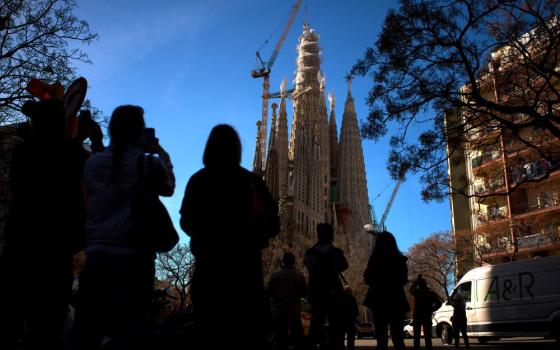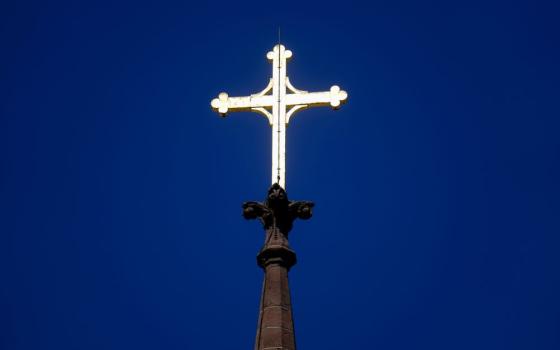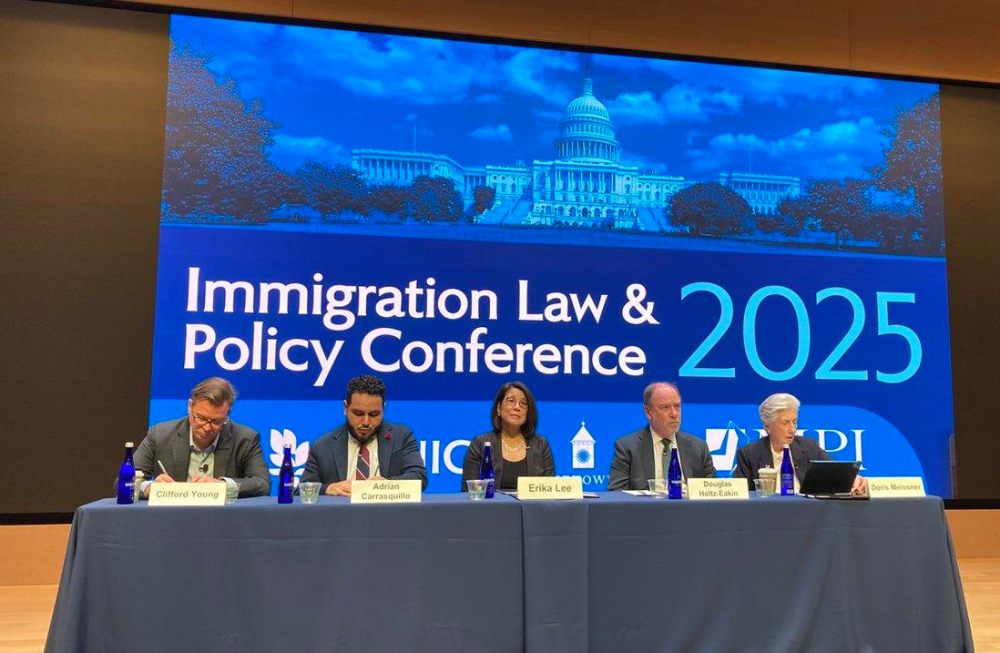
Panelists take part in the Immigration Law and Policy Conference at Georgetown University in Washington Oct 9, 2025. Pictured are Clifford Young, visiting professor of political science, Texas A&M University's Bush School of Government and Public Service; Adrian Carrasquillo, reporter and columnist, The Bulwark; Erika Lee, history professor, Harvard University; Douglas Holtz-Eakin, president, American Action Forum; and Doris Meissner, senior fellow and director, U.S. Immigration Policy Program, Migration Policy Institute. (OSV News/Courtesy of Migration Policy Institute/Julian Hattem)
A woman selling mangos near the Columbia Heights metro station in Washington pulled out her phone and showed the vendors next to her the news she'd just seen.
"Se lo llevaron," she said in Spanish, waving her phone. "They took him."
The phrase, referring to detentions by agents from Immigration and Customs Enforcement, has become commonplace in the nation's capital and in the rest of the country among Spanish-speaking migrant communities.
They are among the groups whose fears and legal vulnerabilities participants of the 22nd Annual Immigration Law and Policy Conference discussed that day at Washington's Georgetown University Law Center. That's where immigration attorneys, paralegals, community advocates, as well as some priests and at least one Franciscan sister, gathered on Oct. 9 to hear a range of legal experts, historians and journalists speak. Panelists painted a picture of migrants consumed by fear and a legal community seeking to defend them, but lacking the resources to do so. They questioned whether the courts can fend off the Trump administration's constant attacks.
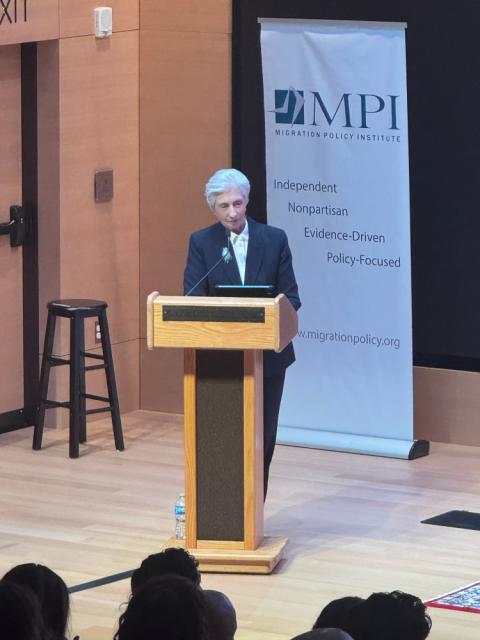
Doris Meissner, senior fellow and director of the U.S. Immigration Policy Program at the Migration Policy Institute, introduces a speaker Oct. 9, 2025 at the 22nd Annual Immigration Law and Policy Conference at Georgetown University Law Center in Washington. (GSR photo/Rhina Guidos)
"We gather today in unprecedented times," Anna Gallagher, executive director of the Catholic Legal Immigration Network, Inc., told the crowd. Her organization, known as CLINIC, along with the Migration Policy Institute and Georgetown Law organized the annual conference.
Conferences of the past provided a legal bird's-eye view of policy in the country's immigration realm, but scholars and experts like Doris Meissner agreed that this year, it's different.
"We have entered a new era," said Meissner, senior fellow and director of the U.S. Immigration Policy Program at Migration Policy Institute, as she moderated one of the panels.
No one exactly knows how this era will evolve.
From the president's public call to end birthright citizenship for children whose parents aren't in the country legally, using information from the Internal Revenue Service to seek out migrants for deportation, and employing military and other law enforcement resources in that effort — those actions raise "profound questions about our society," Meissner added.
Immigration, after all, said CLINIC's Gallagher, touches "every aspect of our country."
A lawyer at the conference addressed the obstacles the government is putting in place to make it difficult for attorneys to contact their clients. An economist voiced worries about the impact of ICE raids at work and said the actions are at odds with economic strategy. A reporter said he had seen the negative impact of immigration enforcement on communities of faith.
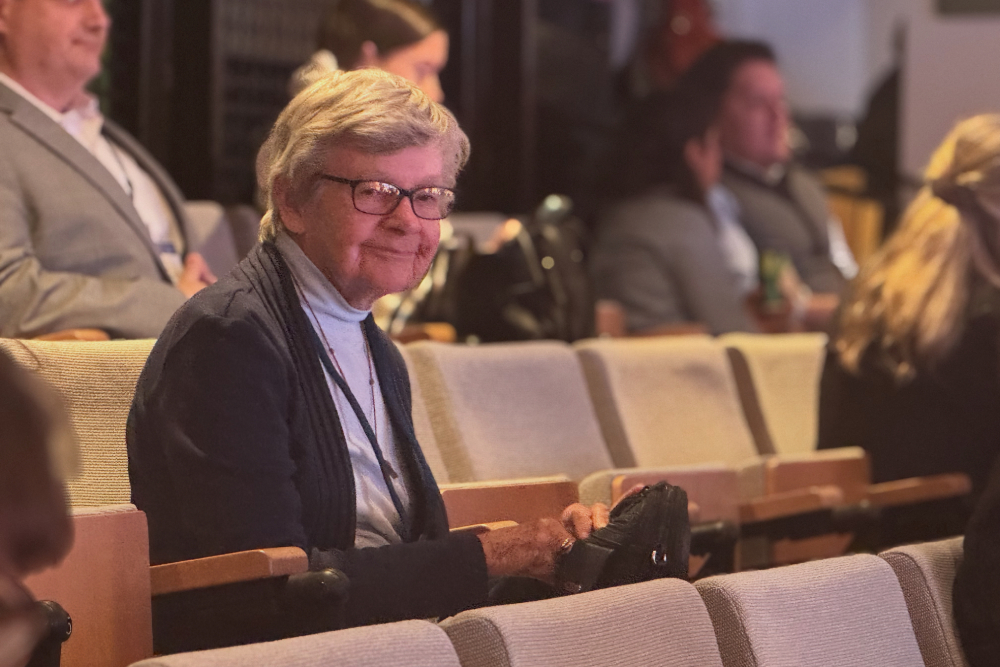
Franciscan Sr. Marie Lucey waits for the afternoon session of the 22nd Annual Immigration Law and Policy Conference Oct. 9, 2025 at Georgetown University Law Center in Washington. Lucey said the current climate in the country is “almost a war against any kind of immigrants.” (GSR photo/Rhina Guidos)
In the audience, Franciscan Sr. Marie Lucey listened to them all. She told Global Sisters Report that in that panorama she sees "almost a war against any kind of immigrants." She said she hoped the country's bishops would listen to the words of Pope Leo XIV, who has spoken against the inhumane treatment of migrants. Lucey said that while sisters have historically accompanied migrants, "we're not in the echelons of authority and power," and Catholics may give more weight to prelates' words and public unity on the topic.
But the pope's views, grounded in Catholic social teaching, go against a present current of anti-immigrant sentiment bubbling up in his native country. Those sentiments are rooted in nativism and belief systems that aren't going anywhere soon, said pollster Clifford Young, a panelist.
"What we are experiencing in the U.S. is not unique," said Young, a visiting professor at Texas A&M University's Bush School of Government and Public Service, who added that similar attitudes are cropping up globally as discontent grows over systems worldwide that have favored some and not others.
And in the U.S., anti-immigrant sentiment has existed before, added panelist Erika Lee, history professor at Harvard University.
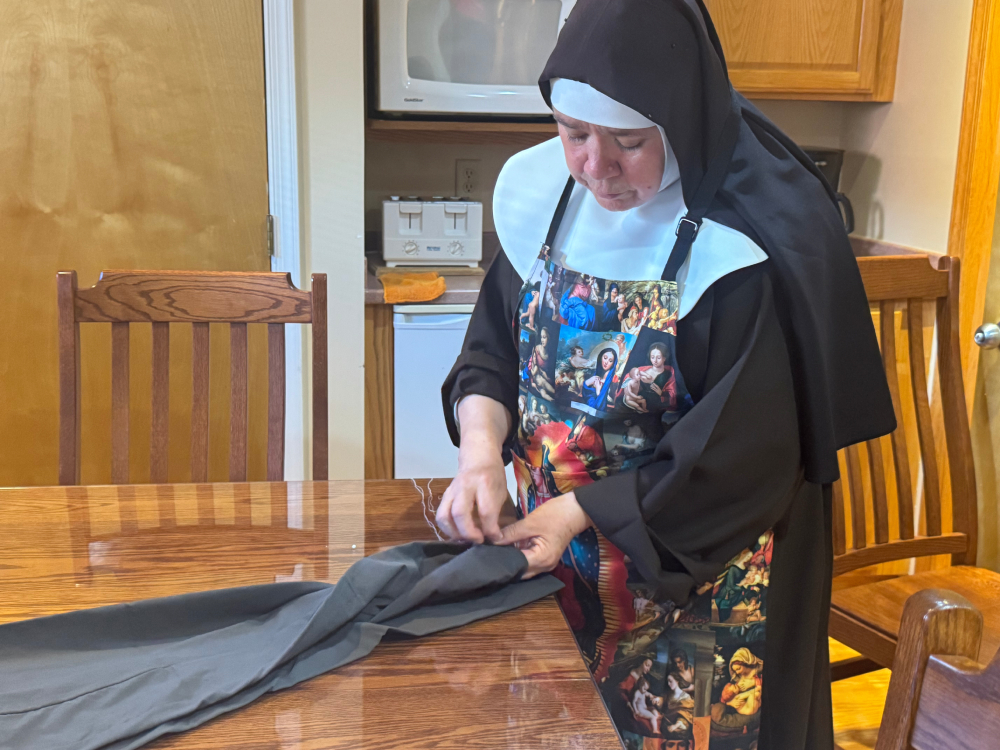
Capuchin Poor Clare Sr. Maria Elena Romero sews Oct. 4, 2025 at the Veronica Giuliani Monastery in Wilmington, Delaware. Though the Capuchins live in a cloistered community, they’re well aware of the fears migrants are experiencing and Romero said she prays for them in the chapel, while cooking and sewing as “they’re children of God.” (GSR photo/Rhina Guidos)
"We can't say that they're blips," she said, yet two different currents can exist at the same time. "We can and have committed ourselves to being a nation of immigrants at the same time that we're restricting, deporting, incarcerating."
The conference coincided with the Vatican's release of Leo's first apostolic exhortation, a document titled Dilexi Te, which focuses on the poor and prominently includes the church's accompaniment of migrants.
"Where the world sees threats, [the Church] sees children," the pope wrote in the document. "Where walls are built, she builds bridges. She knows that her proclamation of the Gospel is credible only when it is translated into gestures of closeness and welcome. And she knows that in every rejected migrant, it is Christ himself who knocks at the door of the community."
Lucey, who sometimes has publicly joined around the Washington area those denouncing the inhumane treatment of migrants, said sisters have an important role to play in the pope's recent message. While not all sisters are called to join public protests, they can take part in the work of the church in a variety of ways: by writing to local representatives, by praying and by turning that prayer into some kind of action.
Advertisement
It is something that Capuchin Poor Clare Sr. Maria Elena Romero, a contemplative, has been able to take part in. In the noiseless hallways of the Veronica Giuliani Monastery in Wilmington, Delaware, she constantly prays for migrants, as do other sisters in the convent's chapel, while cooking or sewing, she said.
Though they live in a cloistered community, the fears of the outside world have crept in. The sisters know about masked ICE agents smashing in car doors, breaking into apartments, shoving people to the ground.
That's because they have made time to listen to Catholics who've called them with their anxieties, asking for prayers as ICE passes through their neighborhood. Some calling to vent fears of a possible capture. Others tell them how much it weighs on them to think about what will happen to their children if they're detained or worse.
"They're children of God and they're our responsibility," Romero said.




